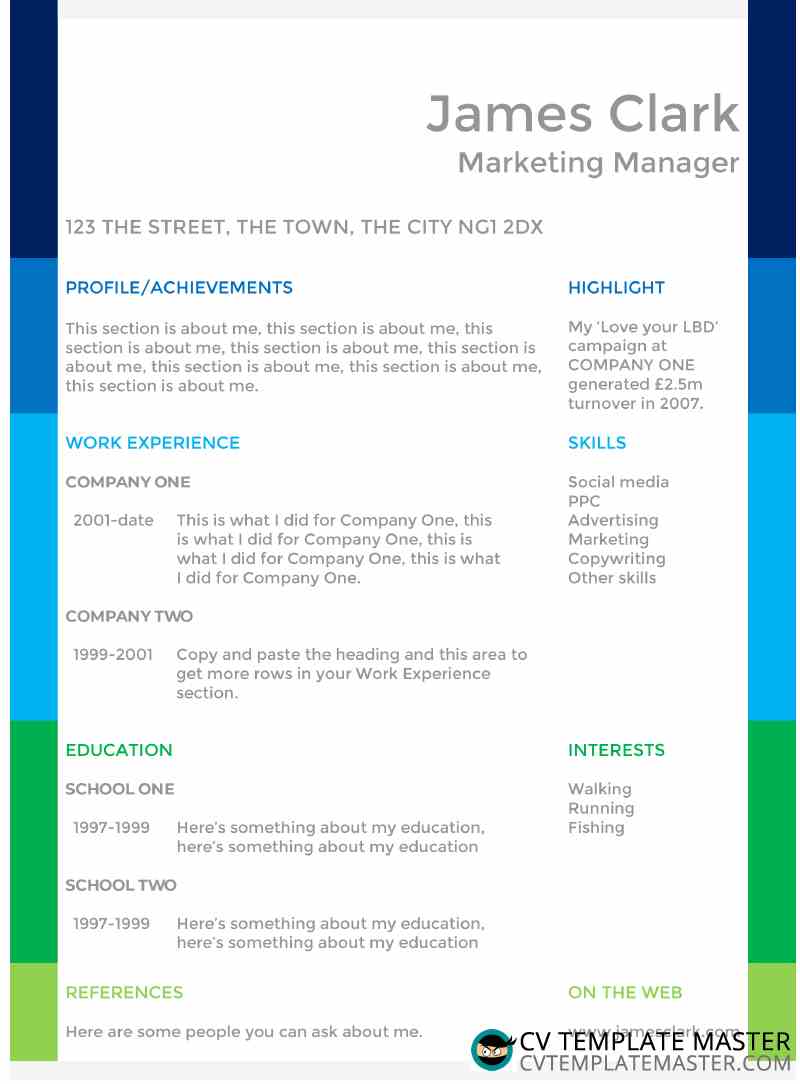Template details:

Extra sections for your Colour Blocks Creative CV template
All of our free CV templates are open for you to edit and customise to suit your needs. Would you like to add an extra section? Sure, go ahead. To help you decide which additional sections you could add, please read on for our in-depth guide.
Certifications
Have you completed training and received a certificate or accreditation for your work? Then include it in your CV. If the accreditation is relevant to the role, then it should certainly be on your CV. However, you may still wish to include anything that isn’t as important to the employer, as it still showcases your achievements. The employer is waiting to be impressed, so don’t miss out a section like this on your CV if it will add value to your application.
Achievements
Did you achieve something either inside or outside of work? For example, the Duke of Edinburgh award, or ‘Employee of the month’?
These accolades tell the employer something about your attitude and work ethic.
Skills
It is a good idea to list skills that are relevant to the job and also list other skills too. For example, good IT skills might not be directly relevant to a bar job, but could come in handy with aspects of running the bar such as printing off advertising material.
You may also consider a ‘Core skills’ section which only lists off a handful of skills which directly relate to the role. This makes it easier for the hiring manager to see that you have the exact skills they are looking for. This core skills section can go just underneath your contact details on page one of your CV (or underneath your personal statement if you’ve written one). Additional skills can then go in a different section further down the page.
Hobbies and interests
Some people choose to leave hobbies off their CV, but they can be a really positive way to tell your employer what sort of person you are. For example, an interest in health and fitness or going to the gym shows your employer you’re likely to have less sick days!
You should certainly put down any hobbies which further demonstrate your soft skills. A soft skill relates to a more generic every day skill, like communication and problem solving. If you are applying for a supervisor role, you may want to let them know that you are the captain of your local sports team. This would demonstrate your leadership and communication skills.
You should never underestimate how important soft skills are to your CV. The hard or specific skills which you are expected to have are the most obvious ones to show on your CV. But the daily interaction between you and your co-workers and possibly even customers is also under the microscope.
The employer wants to know that you are capable of using the skills you claim to have to a high standard. Here’s a great article to read which will help you further – How to show soft skills on your CV.
Why you should be loyal to an employer and your CV
Moving from one job to the next every few months is not a good idea when it comes to your career. Ultimately, everyone wants job satisfaction as well as great pay, and the only way you’re going to get that is if you stick around long enough to find out.
Lots of short term jobs don’t look good on your CV
When an employer reviews your CV they will always scrutinise one of the most important sections – your work history. An employer would always rather see that you’ve spent a good deal of time at your previous places of work, and years rather than months is always more favourable.
Why the employer cares about the length of your previous roles
If the hiring manager is reading through your list of previous jobs and you’ve only worked at each one for a short time, they are going to instantly assume that you’ll do the same with them. Although this may not be your intention, the employer can only go by your previous track record – which is completely understandable.
Someone who has spent years working for a company is obviously going to have a much higher chance of doing the same when applying for a new job. There is also a very good chance that the candidate didn’t get fired from their last job if they worked there for years, and are most likely looking to advance their career.
Would you like to know how long you should stay with a company? Click here to find out more.